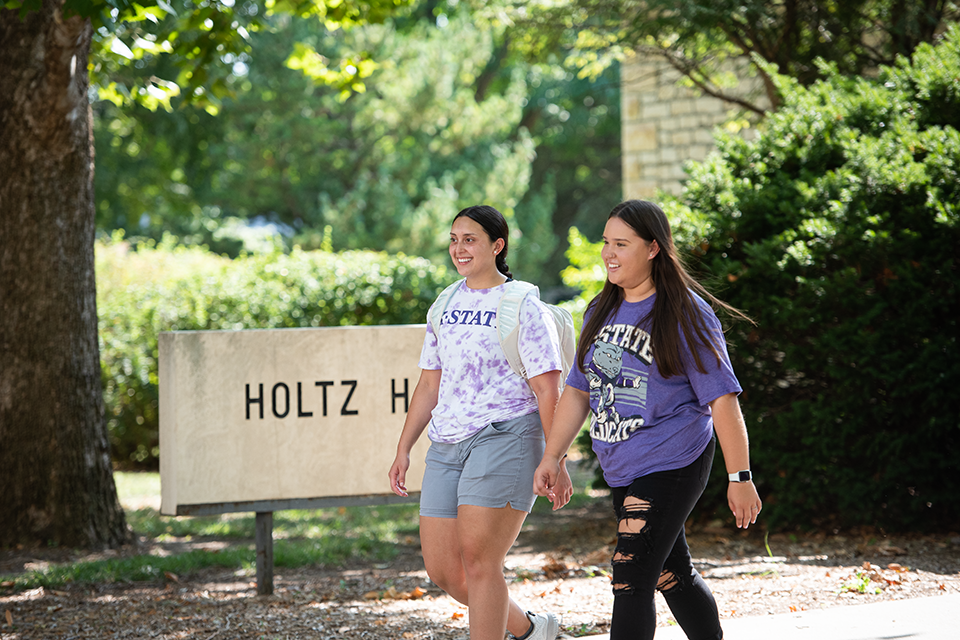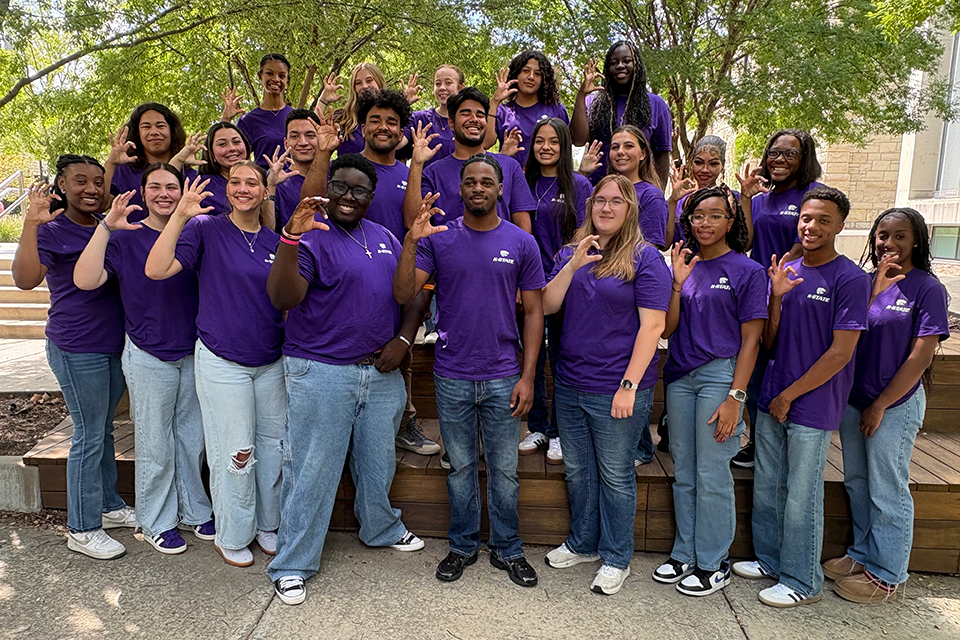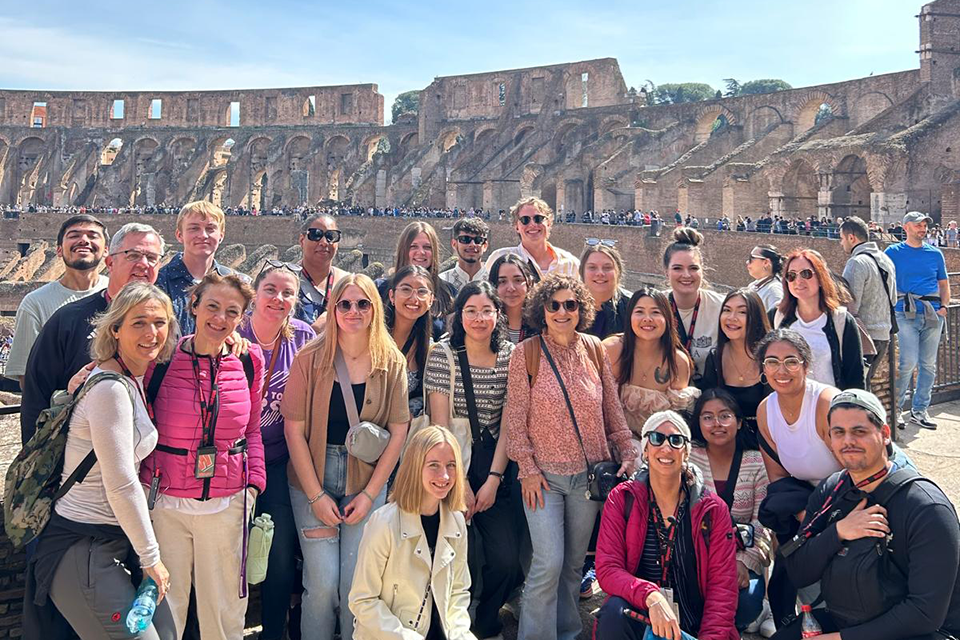Student Belonging programs help K-State students connect, thrive and succeed

Students in TRIO ESS or SSS get access to academic success support, including one-on-one tutoring.
Every student can find their place at Kansas State University. Progress toward a degree is shaped not only by academics but also by opportunities to connect with peers and feel a sense of belonging. By fostering spaces where students can engage, be themselves and feel celebrated, K-State strengthens inclusion across campus.
Student Belonging works with partners across the university to align student life resources with academic support programs and services. Together, these efforts help students meet new people, explore their identities and build the support networks that carry them from their first days at K-State through graduation.
Student Belonging builds pathways and support structures to help students as they progress through their K-State journeys — from incoming students all the way to graduation.
Starting strong: MAPS and Kompass summer bridge programs
Transitioning from high school to university life can be a challenging experience. The MAPS and Kompass summer bridge programs help incoming first-generation, Pell-eligible and all other students prepare for their first year at K-State.
Participants connect with campus resources, meet fellow first-year students and build supportive relationships with mentors who help guide their K-State experience.
"I felt more prepared for my first year at K-State because of the Kompass program," said Ayanna Lopez, a 2025 participant and architecture, planning and design student. "It helped me meet friends and faculty mentors who support me to this day."
Current students can also serve as peer mentors, helping new Wildcats thrive while gaining leadership experience themselves.
"Our peer mentors are key to the success of MAPS and Kompass," said Mirta Chavez, assistant vice president for student belonging. "They offer a unique perspective on life at K-State and pass along advice to new students to help them thrive."
With a 16-year history, the programs support more than 50 students each summer. Their impact is clear: 94% of MAPS students and 85% of Kompass students continue to enroll at K-State. Applications for the 2026 programs, as well as peer mentor positions, will open soon.

The 2025 Kompass cohort spent three days connecting with each other and campus leaders before fall semester.
Building community: First-generation Student Center
About 24% of K-State students are first-generation students — those whose parents or guardians did not complete a four-year degree. Nationally, first-generation students graduate at lower rates than their peers; however, K-State's First-generation Student Center is helping to change that trend.
The center connects students with enriching learning experiences, celebrates their accomplishments and provides a supportive space during times of challenge. As part of a national network of more than 480 institutions, K-State is a First-Gen Forward Champion Institution for its leadership in advancing the success of first-generation students.
"Our center works to remove barriers first-generation students may face in achieving their academic and personal goals," said Rebeca Paz, assistant director of the First-generation Student Center. "In collaboration with campus partners, we celebrate students' achievements and help set them up for success in college and beyond."
Initiatives include an affordable education abroad experience, Proud to be First scholarships, a First-generation Celebration Week, the Tri-Alpha Honor Society and a graduation cord ceremony each May.
"The First-generation Student Center was there for me when I wanted to quit school," said Shawna Logue, senior in social work and addiction counseling. "Rebeca's compassion for the crying mess I was when I walked in her door, and a box of granola bars, turned things around. I'm now a McNair Scholar, a Tri-Alpha Honor Society and Phi-Alpha member, and a Staley Ambassador."
Holistic support: TRIO programs provide cross-campus resources
Students on the Manhattan and Salina campuses can access additional academic and well-being support through TRIO Educational Supportive Services and Student Supportive Services. Available to first-generation, income-limited and students with a documented disability, TRIO programs offer subject and writing tutoring, FAFSA and graduate school preparation, workshops and more.
TRIO ESS has supported students since 1972 and serves approximately 300 students annually, with 82% of them in good academic standing. TRIO SSS supports up to 160 students each year, with 84% of them remaining in good academic standing.
"Our Manhattan students boast an 88% persistence rate and 68% graduation rate, which means we're helping more students achieve their goals and start their careers more prepared," said Eric Thompson, director of TRIO ESS and SSS Salina. "We consistently hear that the individualized support builds student confidence, promotes a sense of belonging and is a key factor in students' success."

The first-generation education abroad experience is an opportunity to gain confidence in international travel.
Connection on campus: A path to student success
Fostering mutual understanding among all students is part of what makes K-State feel like family. It's the reason that all students can connect with each other and celebrate their individuality, and it's one way that K-State promotes student success, enabling all students to reach their goals.
All students are welcome to attend programs and events, including those hosted by student organizations, at the Morris Family Multicultural Student Center, or by applying for scholarship opportunities. Learn more by visiting k-state.edu/belonging.
-Submitted by dassa@k-state.edu